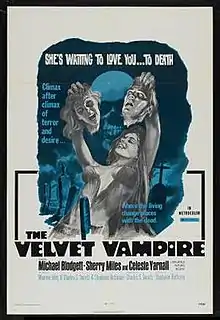The Velvet Vampire
The Velvet Vampire, also known as Cemetery Girls, is a 1971 American vampire film directed by Stephanie Rothman and starring Celeste Yarnall, Michael Blodgett and Sherry Miles. It has become a cult film.[2]
| The Velvet Vampire | |
|---|---|
 Theatrical release poster | |
| Directed by | Stephanie Rothman |
| Produced by | Charles S. Swartz |
| Written by | Stephanie Rothman Charles S. Swartz Maurice Jules |
| Starring | Celeste Yarnall |
| Music by | Clancy B Glass III Roger Dollarhide |
| Cinematography | Daniel Lacambre |
| Edited by | Stephen Judson Barry Simon |
| Distributed by | New World Pictures |
Release date |
|
Running time | 80 mins |
| Country | United States |
| Language | English |
| Budget | $165,000[1] |
Premise
Sleazy guy Lee Ritter (Michael Blodgett) and his out-of-his-league wife, Susan (Sherry Miles) accept the invitation of mysterious vixen Diane LeFanu (Celeste Yarnall) to visit her in her secluded desert estate. Tensions arise when the couple, unaware at first that Diane is in reality a centuries-old vampire, realize that they are both objects of the pale temptress' seductions.
Cast
- Celeste Yarnall as Diane LeFanu
- Michael Blodgett as Lee Ritter
- Sherry Miles as Susan Ritter
- Gene Shane as Carl Stoker
- Jerry Daniels as Juan
- Sandy Ward as Amos
- Paul Prokop as Cliff
- Chris Woodley as Cliff's Girl
- Robert Tessier as The Biker
- Johnny Shines as The Bluesman
Production
The film was Stephanie Rothman's follow up to her 1970 hit The Student Nurses. She and her husband Charles Swartz had written a script, The Student Teachers but producer Larry Woolner wanted to make a vampire film after the success of Daughters of Darkness (1970). Rothman and Swartz came up with a present-day vampire story originally entitled Through the Looking Glass.[3][4] Rothman said she was interested in making a vampire female where a female was the protagonist rather than the victim.[1][5] The character name "Diane Le Fanu" was a reference to author Sheridan Le Fanu, writer of Carmilla.[3]
The script was written over three months. Rothman deliberately put a lot of comedy into it in order to make it different.[6]
Blues artist Johnny Shines appeared in the movie and performed his self-penned song "Evil-Hearted Woman."[7]
The movie was shot in February 1971. Yarnall had only just given birth to her daughter and remembers "everyone was very accommodating, just a joy to work with. Stephanie... was wonderful, open. It was my first experience having a female director and it was remarkable especially concerning the sexual scenes. Stephanie was very sensitive. She closed the set during the more explicit shots, and there was often just Michael and I and the cameraman." [8]
Reception
Roger Corman later claimed he was disappointed with the final product and released it on a double bill with an Italian horror movie, Scream of the Demon Lover.[3]
Box office
Stephanie Rothman admitted the film's commercial reception was disappointing. She thought the problem may have been the movie:
Fell between two stools. It's not a traditional horror film nor a hard-core exploitation movie. In some places it was booked into art theatres. In others it had one week saturation release in drive ins and hard top theatres. There was no consistent distribution pattern for it because people responded differently to it and I think that may be part of the problem. Also it was an independent producer. There were a lot of other competing vampire movies at the time with star names... But the film has not been forgotten. It keeps popping up at festivals and retrospectives which is interesting because it did not draw attention to itself upon how well it did at the box office.[6]
Critical
The Los Angeles Times wrote "Miss Rothman is at her best in love scenes... handled with rare sensual beauty and taste. Unfortunately there's little else to be said for The Velvet Vampire."[9]
See also
References
- Sher, Ben. (2008). Q & A with Stephanie Rothman. UC Los Angeles: UCLA Center for the Study of Women
- Erens, Patricia (1 March 2009). "Film Industry in the United States". Jewish Women: A Comprehensive Historical Encyclopedia. Jewish Women's Archive. Retrieved 31 July 2014.
- Christopher T Koetting (2009). Mind Warp!: The Fantastic True Story of Roger Corman's New World Pictures. Hemlock Books. p. 28.
- Betty Martin (Feb 11, 1971). "MOVIE CALL SHEET: RITA MURRAY SIGNED FOR LEAD IN 'RUNAWAY!'". Los Angeles Times. p. e17.
- 'Exploiting Feminism: An Interview with Stephanie Rothman (Part One)' Confessions of an Aca Fan: The Official Weblog of Henry Jenkins, Oct 16,2007
- Tony Williams, 'Feminism, Fantasy and Violence: An Interview with Stephanie Rothman', Journal of Popular Film & Television 9. 2 (Summer 1981): 84. See also Readers' Forum A Letter of Correction from Stephanie Rothman Journal of Popular Film & Television10.3 (Fall 1982): 137.
- Ben Windham, 'Bluesman Shines still hits the chord', The Tuscaloosa News, July 7, 1985
- "Interview: Celeste Yarnall on THE VELVET VAMPIRE". alexanderonfilm. October 11, 2018.
- Thomas, Kevin (Sep 16, 1971). "'The Velvet Vampire" on Citywide Screens". Los Angeles Times. p. h20.
External links
- The Velvet Vampire at IMDb
- http://www.communistvampires.com/horror/Velvet%20Vampire.htm (A review of the movie)